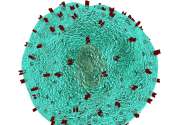CD7 CAR T-cell therapy, stem-cell transplant beneficial for CD7-positive tumors
For patients with relapsed or refractory CD7-positive leukemia or lymphoma, sequential CD7 chimeric antigen receptor (CAR) T-cell therapy followed by haploidentical hematopoietic stem-cell transplantation (HSCT) is safe and ...
Apr 25, 2024
0
1









